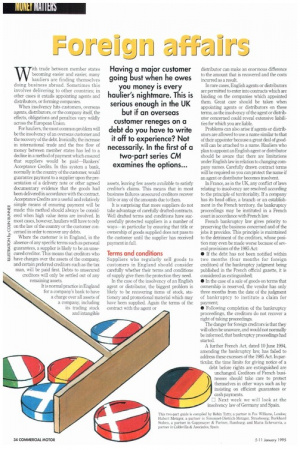W ith trade between member states becoming easier and easier, many
Page 36

If you've noticed an error in this article please click here to report it so we can fix it.
hauliers are finding themselves doing business abroad. Sometimes this involves delivering to other countries; in other cases it entails appointing agents and distributors, or forming companies.
When insolvency hits customers, overseas agents, distributors, or the company itself, the effects, obligations and penalties vary wildly across the European Union.
For hauliers, the most common problem will be the insolvency of an overseas customer and the recovery of the debt. Ironically, the increase in international trade and the free flow of money between member states has led to a decline in a method of payment which ensured that suppliers would be paid—Bankers' Acceptance Credits. In this system a bank, normally in the country of the mstomer, would guarantee payment to a supplier upon the presentation of a delivery note or other agreed documentary evidence that the goods had been delivered in accordance with the contract. Acceptance Credits are a useful and relatively simple means of ensuring payment will be made: this method should always be considered when high value items are involved. In most cases, however, hauliers will have to rely on the law of the country or the customer concerned in order to recover any debts.
Where the customer is in England, in the absence of any specific terms such as personal guarantees, a supplier is likely to be an unsecured creditor. This means that creditors who have charges over the assets of the company, and certain preferred creditors such as the tax man, will be paid first. Debts to unsecured creditors will only be settled out of any remaining assets.
It is normal practice in England for a company's bank to have a charge over all assets of a company, including its trading stock and intangible assets, leaving few assets available to satisfy creditor's claims. This means that in most business failures unsecured creditors recover little or any of the amounts due to them, It is surprising that more suppliers do not take advantage of carefully drafted contracts. Well drafted terms and conditions have successfully protected suppliers in a number of ways—in particular by ensuring that title or ownership of goods supplied does not pass to the customer until the supplier has received payment in full.
Terms and conditions
Suppliers who regularly sell goods to customers in England should consider carefully whether their terms and conditions of supply give them the protection they need In the case of the insolvency of an English agent or distributor, the biggest problem is likely to be recovering items of stock, stationery and promotional material which may have been supplied. Again the terms of the contract with the agent or distributor can make an enormous difference to the amount that is recovered and the costs incurred as a result.
In rare cases, English agents or distributors are permitted to enter into contracts which are binding on the companies which appointed them. Great care should be taken when appointing agents or distributors on these terms, as the insolvency of the agent or distributor concerned could reveal extensive liabilities for which you are liable.
Problems can also arise if agents or distributors are allowed to use a name similar to that of their appointer because a great deal of goodwill can be attached to a name. Hauliers who plan to appoint an English agent or distributor should be aware that there are limitations under English law in relation to changing company names. Carefully drawn contract terms will be required so you can protect the name if an agent or distributor becomes insolvent.
In France, as in the UK, any conflict of laws relating to insolvency are resolved according to the principle of territoriality. If a company has its head office, a branch or an establishment in the French territory, the bankruptcy proceedings may be instituted in a French court in accordance with French law.
French bankruptcy law gives priority to preserving the business concerned and of the jobs it provides. This principle is maintained to the detriment of the creditors, whose position may even be made worse because of several provisions of the 1985 Act: • If the debt has not been notified within two months (four months for foreign creditors) of the bankruptcy judgment being published in the French official gazette, it is considered as extinguished; • hi the case of a sale of goods on terms that ownership is reserved, the vendor has only three months from the date of the judgment of bankruptcy to institute a claim for payment; • Following completion of the bankruptcy proceedings, the creditors do not recover a right of taking proceedings.
The danger for foreign creditors is that they will often be unaware, and would not normally be informed, that bankruptcy proceedings had started.
A further French Act, dated 10 June 1994, amending the bankruptcy law, has failed to address these excesses of the 1985 Act. In particular, the time limits for giving notice of a debt before rights are extinguished are unchanged. Creditors of French businesses should take care to protect themselves in other ways such as by insisting on efficient guarantees or cash payments.
(] Next week we will look at the insolvency law of Germany and Spain.












































































